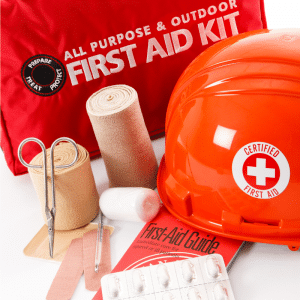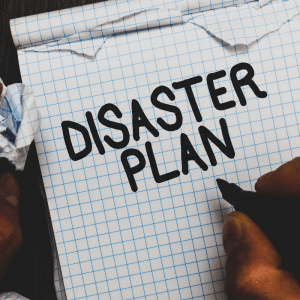Everyone has seen the plethora of natural catastrophes on the news the past couple of years. Photographs and video abound of flooding, volcanic eruptions, hurricanes, tornadoes and earthquakes. Added to this are the reports of wars, famines & nuclear threats. Science is advancing at a break-neck pace, so quickly that ethics are often shoved to the back burner. All of these things can leave a person feeling a sense of discomfort or even fear while trying to live in the world around them. For senior citizens, it can be much more alarming. When we step back and think about the difficulties our bodies would have if certain things happened, it can be sobering.
Instead of allowing fear to take precedence in our minds, however, it is better to think through each of those scenarios and logically break it down into small, actionable steps. We can evaluate it and then take action to prepare ourselves for anything from a power/communication outage for a few days to more drastic situations. In fact, it is better to take steps than to simply dwell on the situations that could happen. Fear and anxiety paralyze. Action empowers.
First, think through the most likely emergencies you are to face & work outward from there. For most people, this would mean a power outage. If your power goes out, will you still have water, heat & communication with the outside world? If the answer to these is no, consider which area you want to tackle first. A stockpile of water for you or any animals you have would be first. If you live in extreme northern climates, that water will mean nothing if you do not have a heat source because it will be frozen much of the year. Think through your heating systems next. Be sure they can operate without electricity or that you have access to heat without power in case this situation arises. If you live in a senior living facility, discuss the emergency protocol with the administration, so you know which things you are responsible to prepare for and whether they have a plan for the facility during an extended power outage. Also, try to have two different forms of communication available. If you have a land-line, you may also want to try to have cell phone for emergencies. Cell phones can be very helpful during a power outage, especially if you have a battery bank.
Water is a subject of much importance, because without it we cannot live. Be sure to have a 3 day water supply set aside, at the very least, but many people prepare for much longer than this. Buying a filtering straw is one way that you can cut down on the amount of water that is necessary to be stored. These straws can be used to filter even lake water and make it into safe drinking water. FEMA recommends one gallon of water per person in your household. Do not forget pets & livestock, however.
Food will be your next concern in case of a catastrophe. If you have a way to cook, you’ll probably be fine with what you have on hand for a few days. If you cannot cook when the power is out, it would be best to supply your pantry with at least a few days-worth of food that does not require cooking so that you will be able to eat & maintain your strength for what lies ahead.
Warmth will be another major concern if disaster strikes during winter months. You must have a plan to stay warm. That plan should include more than one power source, whether those options are wood heat, gas heat, propane, etc. Make sure that you have at least one heavy blanket or sleeping bag for each person in your home. Hot water bottles are also great tools in case of emergency. They can keep you very warm in a sleeping bag & you’ll only need to heat that small space instead of the entire home.
Medications are extremely important too. If you have regular medications that need to be taken, especially in heart patients, be sure that you have your supply about a month ahead of time. Explain to your doctor that you are wanting to be prepared and ask whether it would be okay to get an extra month’s dosage. Also tell him/her that you will be sure to rotate them out so that they will not expire. This is advisable even if you are not preparing for disaster, as sometimes medications run out when the pharmacy is closed. When this happens, people can have adverse reaction if their bodies are accustomed to medications at a certain time each day.
After you’ve prepared for a simple power outage (or other likely scenario), you can begin thinking about what you’d do in longer term situation. Discuss it with family to see if they have any thoughts that might be helpful. Do not slip into paranoia about any possible calamity, but if you live in an earthquake prone area, be sure that you look up earthquake preparedness and act accordingly. If you live in a place that has frequent forest fires, prepare for possible evacuation now so that you won’t be panicked when the call comes. If you live in hurricane prone areas, make the preparation of your home an easy endeavor. Consider shutters on hinges that are sturdy, instead of screwing plywood all the way around the house as this is not a viable option as we age into our 70’s and 80’s. Do anything that you can do to make the problems easier to cope with in case you are ill or injured when disaster hits.
In flood prone areas, think often about the waterproofing of your things, especially documents that will be very difficult to replace. Make sure to have insurance documents among those forms so you can make necessary calls even if you are in a shelter or staying with someone else.
Some people go to the extreme and prepare for biological attacks or nuclear attacks, which I will not go into here. If you feel that that is a probable danger, do your best to prepare what you can, but always remember not to walk in fear. Fear is the worst possible thing before, during or after a disaster. It is not productive. There are many things in life that cannot be foreseen, even if you try to prepare the best that you can. Do not worry about those things, but focus on the things you can be prepared for. You’ll sleep easier, & your family will sleep easier knowing that you’ll be okay for awhile until they are able to reach you in an emergency.
Perhaps the most important part of being prepared is to stay connected. If you have close neighbors, consider discussing whether they’re prepared for a simple emergency. Everyone in your apartment complex or neighborhood will feel safer if they know that their neighbors have also thought ahead and addressed these issues as much as possible. It’s also good to establish good relationships with them in case they have a need that arises that you can meet or if you have a need that they could meet. We all need one another in hard times.
When you’ve prepared as much as you’re able, rest well knowing that you’re ready, or at least more ready than you were at the beginning of this process!



